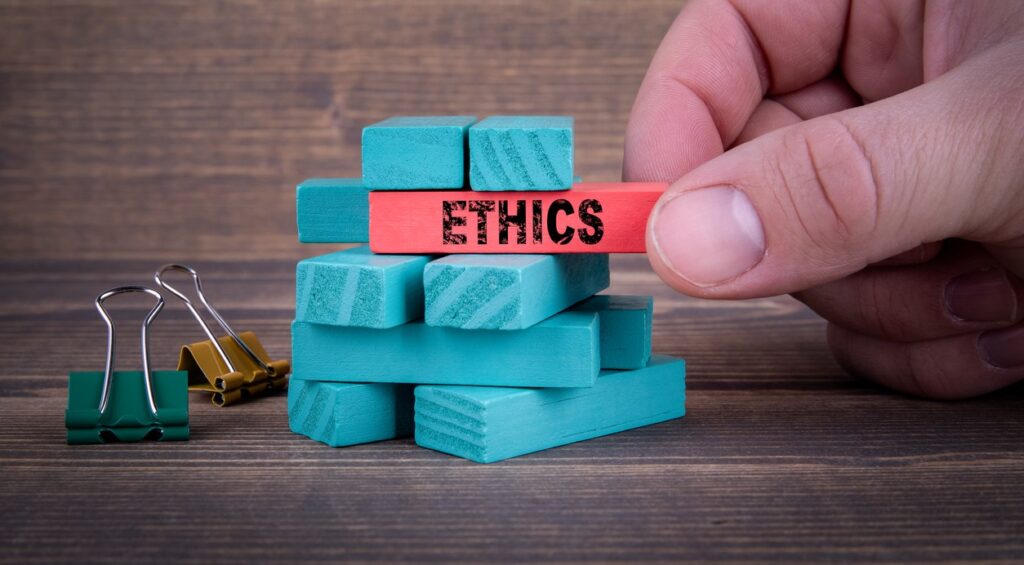In the second article of a nine-part series on ethics in the workplace, Luke Andreski considers the key characteristics of ethical organisations and asks, ‘Is ethics a success factor in modern business?’
It’s worth beginning our discussion with a preliminary question: ‘Are organisations ethical by default?’
The answer to this question is that organisations have no inherent morality. They exist to serve the purpose for which they were created. This may be hierarchy-enforcing, service-delivering or product-producing… but it certainly need not be moral.
It is also important to recognise that the ethics of an organisation’s members need not influence its basic morality. In fact, the normative flow is usually in the opposite direction. It is a natural human trait to submit to the authority of the organisation of which we are part. (This would have been, once upon a time, our ‘tribe’.)
Take, for example, the tobacco companies of the 1990s. These companies pushed for increased sales and profit despite growing evidence of a link between tobacco and cancer. (The film The Insider provides a wonderful insight into this.)
However, this does not allow us to conclude that these companies were operated by immoral people. Rather, they were run by people who considered their personal morality irrelevant. They were doing their job – and an important part of any job is loyalty to your employer, and getting on with the work you are paid for.
The conclusion to draw from this is that morality must be overtly engineered into an organisation’s structure and function. It will not get there by accident.
No matter how loudly we claim to be moral, it is our actions which truly reveal our morality.
Characteristics of an ethical organisation
So, what are the characteristics we would wish to see in an ethical business?
On the basis of the above considerations and our discussion of ethics in the preceding article, I would identify these as follows. Ethical organisations will:
Affirm moral objectives in addition to purely mercantile or functional ones
This will be accomplished through clearly defined mission statements, charters, articles or constitutions. Since there is no structural imperative for organisations to behave morally, morality must be ‘engineered into them’.
Build these objectives into the everyday functioning of the organisation
No matter how loudly we claim to be moral (virtue signalling, anyone?) it is our actions which truly reveal our morality. Therefore our ethical values must be functionally embedded within our everyday activities through the adoption of clear and decisive policies and procedures.
Encourage colleague contribution, self-reliance, participation and wellbeing
Ethical organisations will seek to encourage colleague contribution, self-reliance and participation through training and development, fairness in benefits, pay and opportunity, and encouraging diversity.
Manage its impact on the surrounding community and environment
The ethical business will ensure its impact on the surrounding community and environment is ethical and beneficial rather than exploitative or exclusive.
Be self-aware
It is important for the ethical business to be self-aware, acknowledging its activities and its impact on both direct and indirect stakeholders.
Be open about its objectives
Openness and honesty are key characteristics of ethical behaviour. If businesses are covert or secretive about their objectives, how can they engender trust in those with whom they interact?
Encourage moral behaviour in those who work for them or with them
This is an important final characteristic of the ethical business – a key element of any ethical system is the encouragement of moral behaviour in others. Having clear policies on equal opportunities, diversity, professional conduct and leadership is central to this, as is showing colleagues how these policies can be acted upon in their day-to-day activities.
Our values must be engineered into our organisation’s constitution, function and purpose.
Becoming more ethical
How can we help the organisations we work for or lead become more ethical? This can be achieved through encouraging our businesses to adopt the moral characteristics outlined above.
Our values must be engineered into our organisation’s constitution, function and purpose. And since our ethics must comprise action as well as words, they must be sustained by clear and decisive policies and procedures. They must become part of the daily activities of our working lives.
The ethics of success
So, skirting around the issue of whether ethics should be driven by self-interest, let us ask a pragmatic question: ‘What can ethics give us, as a business?’
The answer is compelling. Ethics offers businesses:
Cohesion
A shared moral vision draws colleagues together at a time when division and polarisation are proliferating within society as a whole.
Motivation and inspiration
Ethics has the power to motivate and inspire. After all, who wouldn’t wish to feel they are working in an ethical business, dedicated (alongside other, functional objectives) to ethical aims?
Pride and self-worth
Ethical behaviour and practice allows us to hold our heads up high, both as colleagues, leaders and managers, and as a business.
A renewal of trust
A 2016 study by Ernst & Young found that less than 50% of global professionals trust their employer. What better way to reacquire this trust than through implementing the ethical measures outlined above?
A market differentiator
According to the Edelman Trust Barometer, customer trust in businesses in the UK fell to an all-time low of 43% in 2018. In this climate, a commitment to ethics, and therefore to reliability and trustworthiness, must serve as a market differentiator – with potentially significant benefits to profitability.
Added value
If we are an ethical company, providing goods or services to high ethical standards, this means our products or services have an inherent added value. They are more likely to be reliable, safe and community- or customer-focused – and therefore our reputation with customers or clients can only be enhanced, to the potential benefit of our market share.
The benefits resulting from engineering ethics into our businesses seem very much like common sense. They beg the question, ‘Why wouldn’t you?’
But this also brings us back to the issue I skirted around at the beginning of this section. As businesses we can gain profitability and resilience through implementing ethical practices. But this isn’t, fundamentally, the point. The point is that we should strive to make the businesses we work within or lead more ethical whether or not we profit from this… simply because, morally, it’s the right thing to do.
[cm_form form_id=’cm_65a14c3f5da64′]
Coming soon
In my next article, ‘The Ethical Manager’, I ask the question: ‘Can you be ethical and still be a successful manager?’ I look at what being a good manager means, and consider the issues of ethics versus efficiency and competitiveness versus integrity.
In the meantime, please get involved and make this a two-way discussion. Leave your comments below and I will respond as quickly as I can.







7 responses
If you enjoyed this article,
If you enjoyed this article, please take a look at my latest book:
Short Conversations: During the Plague
https://www.amazon.co.uk/Short-Conversations-About-Everything-Matters/dp/B089M5BGGF
“Short Conversations” evolved on Twitter. For that reason, it’s a book about everything – because that’s what you find on Twitter: just about everything.
It asks questions like:
– Can we fix a broken media?
– Can we become cleverer?
– Is a better world possible?
– Is eating meat a crime?
– Is a virus killing our world?
– Are there reasons for hope?
All these questions are there on social media, with a thousand different answers to each one.
And that’s a problem…
With so many answers on offer, how can we tell which are the right ones?
Well, I’m going to surprise you… Good answers can be found.
If you go back to basics and build up from there; if you use both common sense and logic; if you root your thinking in the evidence; and if you assert the moral context – then you’ll find answers with heft; answers you can count on; answers you can use.
So, “Short Conversations” is about these questions and many others. It asks questions, it identifies problems, and it offers answers.
Answers on which you can count.
In a recent conversation
In a recent conversation someone used a phrase I had not heard before: “bounded ethicality”. She explained it to mean that when we are wearing our ‘cognitive blinkers’ and making business decisions or carrying out activities we may be quite unaware of deeper considerations such as the environment, social and just economy issues … so we need to develop ‘larger minds’, ways of discerning, seeing that enable us to widen our business frames. This article by Luke eloquently covers this concept.
‘Bounded ethicality’ and
‘Bounded ethicality’ and ‘cognitive blinkers’ – thank you for sharing these two very telling concepts….
Who could deny that these two types of thinking (or constraints upon thinking!) are extensively encountered, not only in business and the workplace, but also very much in the political realm?
If you are interested in the
If you are interested in the wider issues of ethics and the applicability of moral intelligence to the modern world, please take a look at my recent book on this important topic:
http://www.amazon.co.uk/Ethical-Intelligence-Luke-Andreski/dp/179580579X
For a longer version of this
For a longer version of this article please visit the Phase 3 Insights hub:
The Ethical Business
https://phase3.co.uk/ethics-in-the-workplace-the-ethical-business-by-luke-andreski/
What struck me as I read your
What struck me as I read your article between the lines Luke was how easily we are influenced (often unconsciously) by the societies, communities, institutions and organisations that we are a part of – an extreme form being what Scott Peck termed “fragmentation of conscience”. For me this flags the importance of leader role-modeling.
(I love the logical flow of your articles)
centserv wrote:
[quote=centserv]
What struck me as I read your article between the lines Luke was how easily we are influenced (often unconsciously) by the societies, communities, institutions and organisations that we are a part of – an extreme form being what Scott Peck termed “fragmentation of conscience”. For me this flags the importance of leader role-modeling.
(I love the logical flow of your articles)
[/quote]
Thank you for your comment above – and I am in full agreement. That ‘willingness to conform’, and powerful desire to be a part of a group or organisation, can overwhelm our moral selves, enabling unethical behaviour in colleagues or managers who in their personal lives would otherwise be deemed irreproachable. The term fragmentation of conscience’ powerfully reflects this.